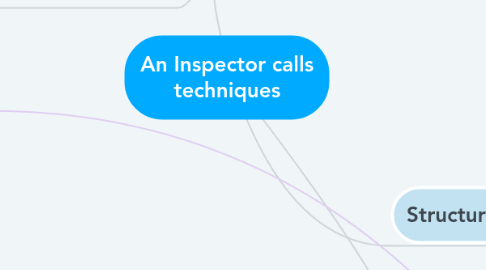
1. Form
1.1. Form is the type of text and genre that a text is written in.
1.2. An Inspector calls is a play that can fit into two possible gernes: crime thriller or morality play
2. Language and linguistic devices
2.1. Dialogue
2.1.1. Dramatic pauses
2.1.1.1. To create a dramatic cliff hanger at the end of act 1, the Inspector says to Sheila and Gerald "well?". There would have been an intermission at the end of the act. This left the audience questioning and guessing an created tension and suspense.
2.1.2. Repetition
2.1.2.1. Adds a sense of realism to his characters and dialogue - "He could. He could have kept her on instead of throwing her out" - Eric. Shows hesitation or uncertainty
2.1.3. Gasps and interruptions
2.1.3.1. Keeps the story fast paced and creates tension subconsciously as interruption is rude. Also leaves some things unsaid and gets the audience thinking even once the play is finished.
2.1.4. fluency and length
2.1.4.1. Priestly uses a variety of sentence lengths for each character. This sets the pace of the drama and helps the audience get to know the characters better. At the start, Mr Birling uses long sentences while describing his beliefs, however Eric delvers lines that are short with breaks in them to show his lack of confidence.
2.1.5. Dramatic irony
2.1.5.1. Used a lot during Arthur Birling's speeches at the begining of the play when he's talking about the possibility of world war 1 and the Titanic being unsinkable. Priestly does this to make the audience feel that Arthur is naive and silly.
2.2. Stage directions
2.2.1. Sound effects - sounds of doors slamming upon character's exits and the phone ringing create tension.
2.2.2. Priestly also uses stage directions such as: 'bitterly', 'distressed' and 'after a pause, with a touch of impatience' to help express the emotions of each character and to help the audience gauge their reactions.
3. Structure
3.1. The Play has only three acts: he uses the first act to introduce us to all the characters and get a feel for their views and the type of people they are. In the second act The Inspector reveals a lot of information to the family and leaves the act of a cliff hanger. Finally in the third act, answers are given and The Inspector leaves. Everything seems resolved, but then Preistly fits another plot twist into the story.
3.2. Time: Priestly also makes use of time, talking about what happened two years ago and The Inspector tells them that Eva died two hours ago, making it feel very current.
3.3. Entrances and exits in the play: Most characters leave at some time during the interrogation - Gerald leaves with Goole's permission, Eric is missing for a large chunk of the play and at some point Sheila runs out crying.
3.3.1. This represents each character wanting to escape their crimes. This links to their privilege - they are used to being able to run away from their responsibilities. The Inspector leaves to let Gerald and Sheila talk about Gerald's affair, which later enables him to get more information out of the two.
3.3.2. Eric's entrance is quite dramatic, signaling the nearing of the end and the revelation The Inspector is about to give.
3.3.3. Additionally, each time a character leaves, they slam the door this causes tension in the audience.
3.4. The Inspector gradually gives the audience information on Eva Smith, causing them to start making assumptions at about her character at each new idea the Inspector introduces.
3.5. Cliff hangers: Each act ends on a cliff hanger, act 1 ends on a question and Sheila becoming hysterical, for example.
3.6. "As they stare guilty and dumbfounded, the curtain falls" After finding out that a girl really did kill herself after the previous though that there was nothing to worry about and that Eva Smith's death wasn't real
3.6.1. This use of repetition of events - Another Inspector is coming to question them could symbolize the regret and guilt the family will have to live with - "She'll make you pay a heavier price too." - Inspector Goole.
